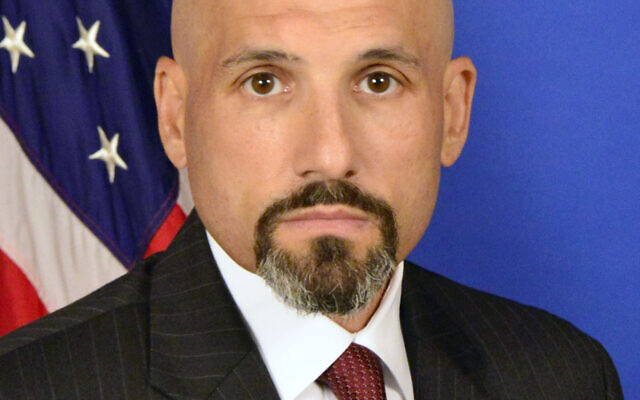New Jewish Security Director Changes his Atlanta Focus
Neil Rabinovitz brings more than two decades experience in the local FBI field office to his new post overseeing security for Atlanta’s Jewish community.
Dave Schechter is a veteran journalist whose career includes writing and producing reports from Israel and elsewhere in the Middle East.

When the COVID-19 crisis eases, Neil Rabinovitz is looking forward to leaving his house and engaging in the hands-on work that goes with being the director of community security for the Jewish Federation of Greater Atlanta.
Rabinovitz, whose nearly 22-year career with the FBI was spent in Atlanta, assumed the position in April, just after synagogues, schools and other Jewish institutions shut their doors as a health precaution.
Thus far, the 52-year-old Boston native has been on countless video conference calls and met, “virtually,” hundreds of members of the community. “I’ve gotten a very warm welcome,” Rabinovitz said during a video conference interview.
Rabinovitz knows that much of his work must be done in person. “My job is making sure that the community is as best prepared for a crisis as it can be. From day one when I took the job, if something happened it’s my responsibility,” he said.
Rabinovitz’s role embodies a unique relationship between the Jewish Federation of Greater Atlanta and the Secure Community Network, the nationwide security program sponsored by the Jewish Federations of North America. While he is paid by JFGA, he technically is an employee of SCN. Rabinovitz described it as “waving the Federation flag, but wearing a SCN pin.”
The relationship provides Atlanta with the available intelligence regarding threats, locally or nationally, as well as resources on best practices and training. The security clearance that Rabinovitz keeps from his previous career allows him to maintain access to the FBI and the Department of Homeland Security.
Security training is available to every Jewish institution at no cost, Rabinovitz said, adding that the goal is to “make sure that the community is situationally aware of threats and has a plan in mind; with that comes empowerment.”
The balance is found somewhere between being paranoid and complacent, he said. “Security is not an end state. It’s constantly re-evaluating and updating your plan,” Rabinovitz said. It’s a theme that his predecessor, Cathal Lucy, stressed in every interview.
Rabinovitz will be assisted by Zach Williams, formerly of the Georgia Emergency Management Agency. He joined the Federation two years ago as assistant to Lucy, who left that post in the summer of 2019. Beginning in 2001, Atlanta was the first community to have a full-time director of Jewish community security.
Growing up in Boston, Rabinovitz was “casually observant,” attending a Conservative synagogue and a Hebrew high school. He holds a bachelor’s degree in economics from Brandeis University and a law degree from American University’s Washington College of Law.
“I was always interested in law enforcement from the time I was young. I wanted to protect people. I viewed criminals as bullies and I didn’t like bullies,” Rabinovitz said, calling the FBI “the ultimate in law enforcement.”
After graduating from the FBI Academy at Quantico, Va., and being posted to Atlanta, Rabinovitz was assigned the duties of a new special agent, and then moved on to the violent crimes unit, before becoming a bomb technician and team leader of the FBI’s Atlanta bomb technician program. His resume includes security planning for such major events as the Super Bowl and collegiate sports championships.
Rabinovitz was drawn to the hazardous work of a bomb technician because of its challenge and “the camaraderie and the people; it’s a tight knit group,” he said. “The more I learned about all the facets of being a bomb technician – the chemistry, physics, electronics – the more I enjoyed it.”
Rabinovitz admitted that he’s probably more comfortable dealing with bombs than with the COVID-19 coronavirus.
Among the issues already on his plate is assisting the Jewish community as it decides when and how to reopen after generally shutting down in mid-March as a COVID-19 precaution. When institutions decide to reopen is less an issue for Rabinovitz than how the reopening is done, perhaps in a phased approach. “We take everybody’s health as paramount. Everything else falls under that,” he said.
Another piece of Rabinovitz’s work will be helping Jewish institutions access money from the federal Nonprofit Security Grant Program. Nonprofits apply for funds through GEMA. If approved at the federal level, the money routes through GEMA to the institutions to meet needs laid out in specific plans. Funds can be used to pay for security training, planning and exercises, as well as certain forms of security equipment.
For fiscal year 2019, when the program nationally made available $60 million, $1.09 million was allocated for the Atlanta urban area and $199,000 was allocated for Georgia outside of the Atlanta area.
Nine of the 12 Atlanta area recipients were Jewish institutions: Berman Commons and The Jewish Tower, both operated by Jewish HomeLife, along with Chabad House of Cobb, Chabad of North Fulton, Congregation Beth Tefillah, Jewish Kids Group, Temple Emanu-El, Temple Kehillat Chaim, and Young Israel of Toco Hills (now known as Ohr HaTorah). Two of the three recipients of funds outside of Atlanta were Jewish institutions: Camp Ramah Darom in Clayton, Ga., and Congregation B’Nai Israel, in Albany, Ga.



comments